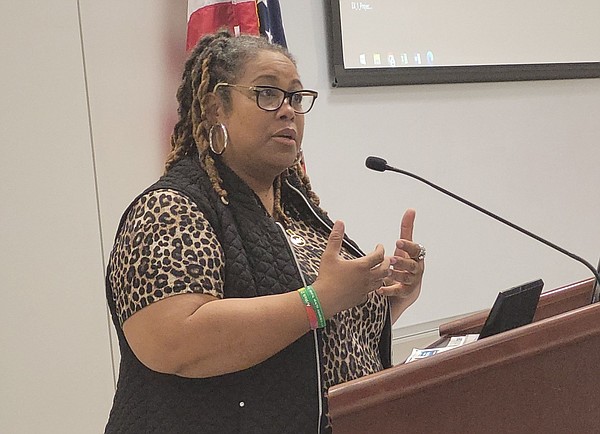
em {
display: contents !important;
}
label em {
display: none !important;
}
.photo {
width: 100%;
max-width: 50rem
}
a.fr-file {
color: #0274b7 !important;
}
FAYETTEVILLE — The stress and pressure of college often leads to mental health challenges for students, so it’s paramount for them to find connections on campus, take advantage of resources, and remember to give themselves a little “grace” when they err, according to a panel of experts who discussed the issues Wednesday at the University of Arkansas at Fayetteville.
“Make sure you have an outlet,” someone to talk to, a “connection,” because “talking saves lives,” said Kymara Seals, who helped launch the D’Andre Seals Suicide Prevention Outreach Project — a 501(c)(3) nonprofit — in 2019 to educate and promote awareness of mental health issues and suicide prevention after her son, D’Andre Seals, a 2012 Pine Bluff High School graduate, died by suicide in 2014. Too often, though, these discussions are not encouraged; instead, “we sit with our trauma.”
It behooves students to “get engaged and involved” to find their community and sense of belonging, said Xavier Smith, career counselor for Fulbright College of Arts and Sciences and an alumnus of the Honors College. Also, “be patient with yourself,” because building resilience when “you miss the mark” is more important than perfection.
“Don’t be afraid to put yourself out there” and meet new people, seconded Lia Childress, a mental health therapist and UA-Fayetteville graduate with a Master of Science in clinical psychology. “The most learning you’ll do” is by getting to know people with different views and backgrounds.
College students are experiencing high rates of depression, anxiety, and suicidality, according to the latest Healthy Minds survey, which received responses from nearly 100,000 students at more than 130 campuses during the 2021-22 academic year. Nearly half of those surveyed reported depression symptoms, 37% reported anxiety, and 15% said they have seriously considered suicide — the highest rates in the survey’s 15-year history.
In college, “you will feel alone, but you are not alone,” said Dr. Carlos Acosta, assistant medical director in the Pat Walker Health Center on campus. Others are going through similar strife, or they have endured similar trials, or they will soon.
It’s also crucial for mental health professionals to reach out to students, particularly from underrepresented groups, said Alejandro Ruiz, a registered mental health counselor at the University of Florida Counseling and Wellness Center. “Be proactive.”
Seals concurred, noting, “You’ve got to go to the students” and develop rapport to build bridges.
For Childress, “personal stories” connect her with those she’s advising, she said. “I give enough disclosure to be relatable.”
Faculty and staff need to “open spaces for conversations” with students, Smith said. That won’t necessarily “fix” a student’s mental health challenges, but it can at least create “understanding.”
Georgeanna N. Wright — director of University Honors and assistant professor of health informatics and health information management at Arkansas Tech University — moderated Wednesday’s discussion, “Destigmatizing Mental Health in My Community,” which focused on the mental health of students from underrepresented backgrounds, particularly high-achieving students like those in Honors Colleges, and kicked off the National Society for Minorities in Honors Conference on campus, which continues through Friday, according to the university.
The conference concentrates on defining the value of an honors education, evaluating success metrics, and creating a welcoming and inclusive honors experience for all.
Many Honors College students from historically underrepresented groups are “walking a tightrope,” trying to be the one to bring honor to their family name, and college feels like their “one shot,” Acosta said. “Imagine that pressure.”
For students from historically marginalized communities, “representation” — seeing someone who looks like them when they seek mental health services, for example — is critical, Smith said. He would also like to see more colleges and universities “tap into” resources available in their surrounding communities — beyond only the campus — from barbershops to churches in order to provide options for students.
It’s incumbent upon minorities working in the mental health profession today to “raise up” the next generation in order to boost representation, as marginalized communities are more likely to be impacted by mental health disorders, but “the last to get help,” Childress said. In the U.S., only 4% of psychologists are Black, and in Arkansas, fewer than 10% of psychologists speak Spanish.
“When I was young and dealing with mental health struggles, it was really eye opening and heartwarming to talk to someone who looked like me and [spoke] Spanish,” said Ruiz. “I felt free to be human.”
